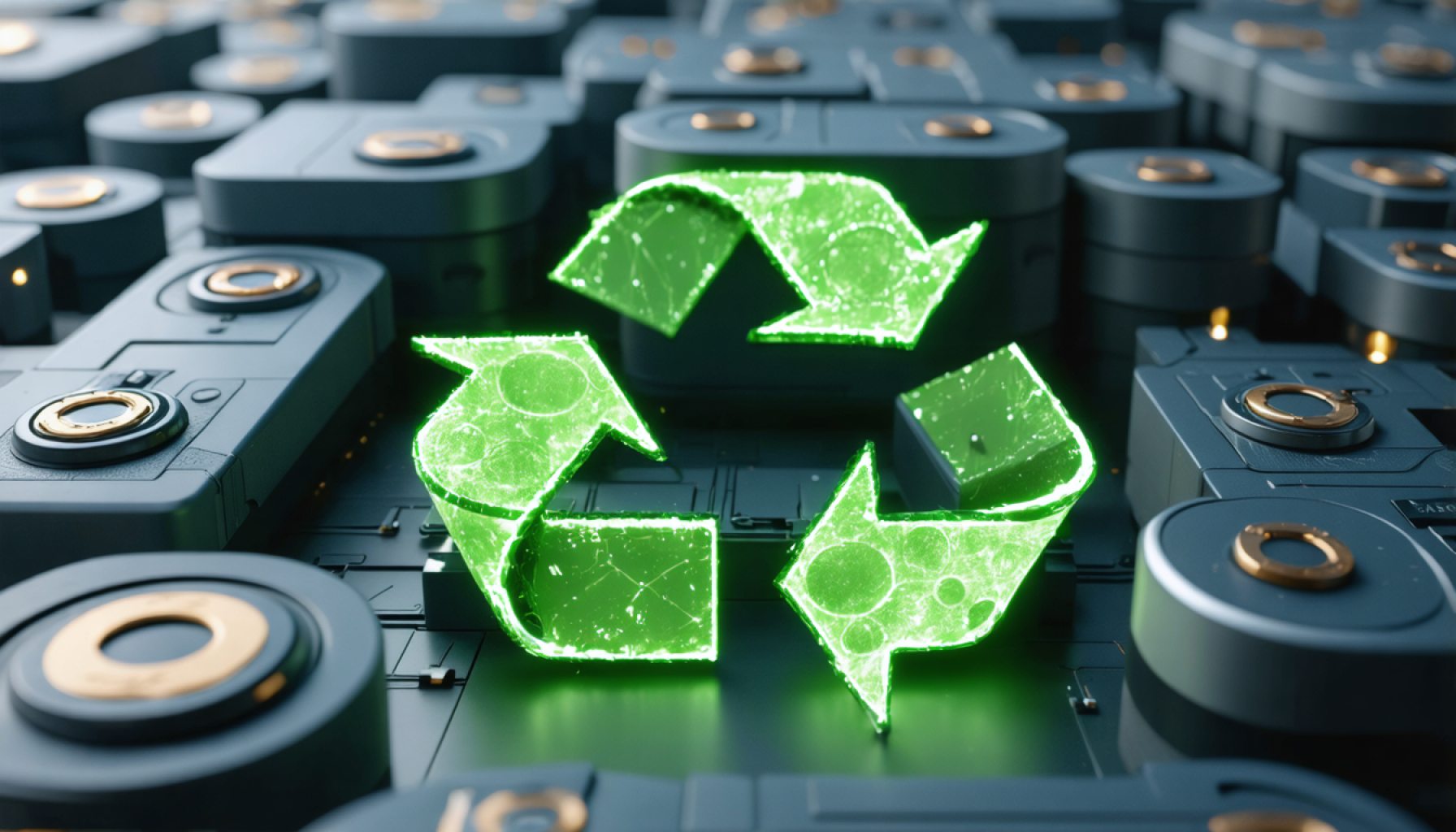
- Altilium advances clean technology with EcoCathode materials, tested successfully at the UK Battery Industrialisation Centre.
- Recycled materials from electric vehicle cells in Devon show performance almost equal to conventional ones, with negligible variance.
- Altilium’s process reclaims over 95% of critical metals, reducing the carbon footprint of traditional mining and promoting sustainability.
- This breakthrough supports battery circularity in the UK, proving recycled materials maintain quality without compromise.
- The innovation reduces dependency on imported battery materials, fostering local industries and potential market growth for recycled batteries.
- Key industry figures forecast positive economic impacts and emphasize the role of innovation in achieving sustainability goals.
In the heart of England’s Midlands, where innovation dances with industry, a remarkable advancement in clean technology unfolds. Altilium, a pioneering force in sustainable solutions, has embarked on a journey that could forever change how we power our electric vehicles. Within the walls of the UK Battery Industrialisation Centre (UKBIC) in Coventry, Altilium’s EcoCathode materials were put to the test, and the results have captivated the attention of the global technology community.
Under the fluorescent hum of the state-of-the-art facility, Altilium’s recycled materials took the spotlight, proving that the future of EV batteries might not rest solely on the shoulders of mined metals. These materials, harvested from defunct electric vehicle cells at the company’s Devon facilities, displayed performance metrics almost indistinguishable from those of conventional materials. Electrochemical tests revealed a mere whisker of variance—less than a percentile—compared to traditional benchmarks. This pioneering revelation was reinforced by seamless manufacturability, as the recycled cells smoothly coursed through the production processes without a hitch.
Imagine a world where the bulging demand for metals like lithium doesn’t spell environmental calamity. Altilium’s process can reclaim over 95% of these critical elements. Not only does this innovative method offer an oasis of sustainability, but it also significantly trims the carbon footprint associated with traditional mining practices. It transforms what might have been waste into a wellspring of opportunity.
As dawn breaks on this new era of recycling, Altilium’s success story becomes a testament to what can happen when inventive engineering meets environmental necessity. Dr. Christian Marston, CO-Founder of Altilium, hails this milestone as a watershed moment—proof that recycled materials do not equate to compromised quality. With every successful test, the notion of battery circularity in the UK becomes more than just a dream—it solidifies into tangible reality.
Moreover, this technological leap could sculpt the landscape of global battery supply chains. By reducing reliance on imported materials, it empowers homegrown industries to thrive, potentially birthing a robust market for recycled batteries. Richard LeCain, UKBIC’s Chief Technology Officer, shares an optimistic forecast, envisioning a future where collaboration and innovation unlock new economic avenues.
In this riveting interplay of technology and sustainability, Altilium stands poised at the forefront, setting the stage for a cleaner and more sustainable future. As we chart our course toward net zero, innovations like these beckon us toward a horizon rich with possibilities, our path illuminated by the sparks of ingenuity and green technology.
Stay attuned to the unfolding developments in the electronics ecosystem, and seize opportunities to engage with industry shapers at pivotal acts such as the Evertiq Expo. As we march into a more sustainable future, remember: innovation is our compass and sustainability, our guide.
Pioneering the Future of EV Batteries: Altilium’s Revolutionary Path in Sustainable Technology
Introduction
In the bustling epicenter of the UK’s Midlands, Altilium is spearheading a critical revolution in clean technology with groundbreaking advancements in recycling electric vehicle (EV) battery materials. At the UK Battery Industrialisation Centre (UKBIC) in Coventry, Altilium’s development of EcoCathode materials marks a transformative leap that could redefine the EV industry’s environmental impact. Here, we delve deeper into this innovation, explore practical applications, and consider the wider implications for sustainable technology.
Unpacking Altilium’s Breakthrough
Altilium has demonstrated that recycling EV battery materials can achieve almost parity in performance with conventional mined metals. This minor variance—less than a percentile—demonstrates the potential for these recycled materials to rival traditionally sourced components’ efficiency and reliability. The success of these electrochemical tests highlights a crucial shift towards sustainable manufacturing practices.
How It Works: Life Cycle and Environmental Impact
1. Sourcing and Recycling: Altilium recycles cells from obsolete EV batteries, successfully reclaiming over 95% of critical elements like lithium. This approach mitigates the environmental degradation associated with mining.
2. Manufacturing Process: The recycled materials undergo rigorous electrochemical tests, showing seamless integration into current manufacturing processes, reflecting both the viability and scalability of this sustainable approach.
3. Reduced Carbon Footprint: The innovative technology significantly slashes the carbon emissions tied to conventional battery production, making it an attractive option for industries aiming to reduce their environmental impact.
Real-World Applications and Benefits
– Supply Chain Resilience: By localizing the production of key battery components, the UK can reduce its dependence on imported materials, thus fortifying its supply chain and supporting domestic industrial growth.
– Economic Implications: A surge in demand for recycled batteries could foster new markets, stimulating economic growth and job creation within the sustainable energy sector.
Industry Trends and Market Forecasts
The global demand for recycled battery materials is projected to skyrocket as industries pivot towards sustainability. According to a report by MarketsandMarkets, the battery recycling market is expected to grow at a CAGR of over 8% by 2025, driven by technological advancements and regulatory support for sustainable practices.
Controversies and Limitations
While Altilium’s methods showcase promising results, the scalability of such recycling processes is still under scrutiny. The existing infrastructure must evolve to handle the increasing volume of battery waste efficiently and cost-effectively. Additionally, the recycled product’s market acceptance and consumer perception regarding performance and safety remain pivotal.
Insights and Predictions
Altilium’s innovations signify a promising shift in how industries approach sustainability. As technological advancements continue, we can anticipate the wider adoption of recycled materials, leading to enhanced sustainability practices across various sectors. This transition could mark a new era where recycling is not only environmentally imperative but also economically advantageous.
Actionable Recommendations and Quick Tips
– Industry Stakeholders: Invest in infrastructure upgrades to facilitate more efficient recycling processes, which will help meet the future demand for recycled materials.
– Consumers: As the market for recycled batteries grows, consider purchasing vehicles and gadgets that utilize these sustainable components to support green technology initiatives.
– Policymakers: Encourage policies that incentivize the use of recycled materials, fostering an environment that supports sustainable innovation.
Conclusion
Altilium’s contributions to sustainable technology are carving a new path for the future of EV batteries. This leap towards eco-friendly practices promises a more resilient, greener future. Stay updated with industry advancements by engaging with platforms like link name and explore opportunities to participate in the clean tech revolution.
Altilium stands not just at the forefront of innovation but as a beacon guiding industries toward a sustainable future. As we harness technology’s power to redefine environmental impacts, let’s remain focused on a balanced approach that marries technological brilliance with ecological responsibility.



